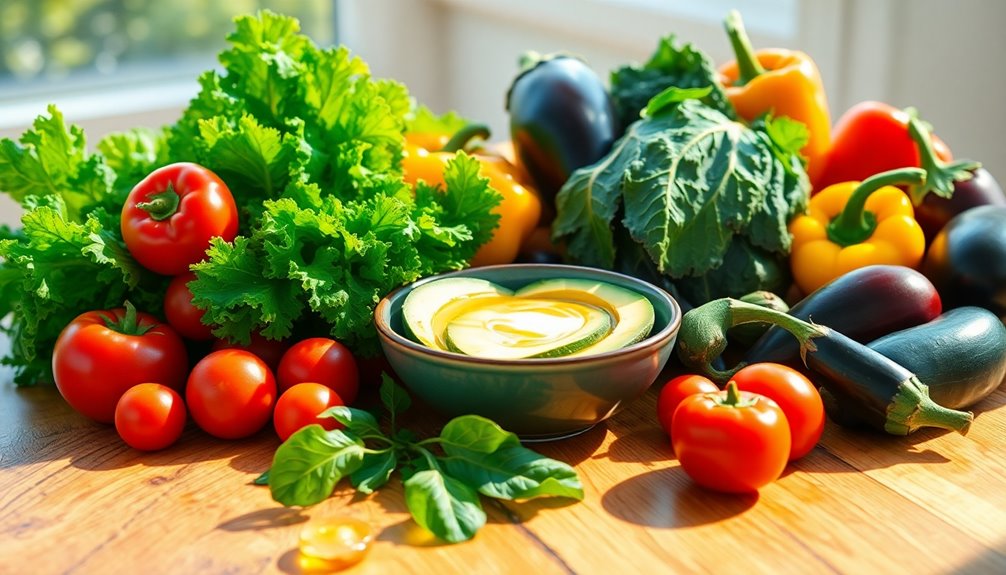A vegetarian diet focuses on plant-based foods and excludes meat, offering a wide range of flavors and nutrients. By incorporating fruits, vegetables, whole grains, legumes, and nuts, you can enjoy various health benefits, including lower risks of heart disease and enhanced energy levels. It's important to make sure you're getting enough protein and essential vitamins, such as B12, which you might need to supplement. Different types of vegetarian diets exist, like lacto-ovo or vegan, allowing for flexibility. This lifestyle not only supports your health but also has positive environmental impacts, making it worthwhile to explore further.
Key Takeaways
- A vegetarian diet excludes meat and focuses on plant-based foods, including fruits, vegetables, whole grains, legumes, nuts, and seeds.
- It offers numerous health benefits, such as lower risks of heart disease, improved weight management, and higher energy levels.
- Different vegetarian diets exist, including flexitarian, lacto-vegetarian, ovo-vegetarian, lacto-ovo vegetarian, and vegan, allowing for various dietary preferences.
- Adopting a vegetarian lifestyle can significantly reduce your environmental footprint and promote sustainable agricultural practices.
- Transitioning to a vegetarian diet involves meal planning, exploring diverse protein sources, and gradually increasing meat-free days.
What Is a Vegetarian Diet?
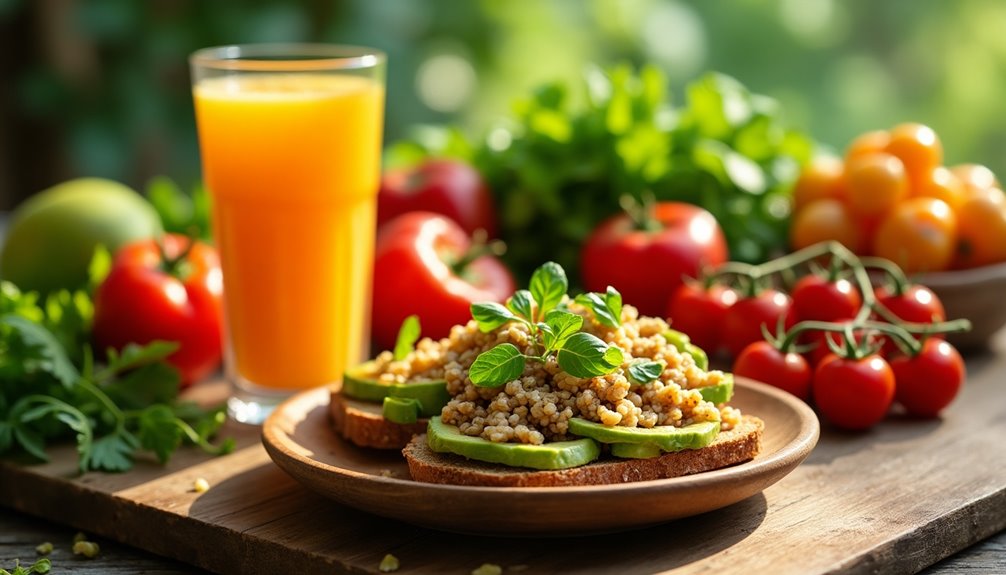
A vegetarian diet, which primarily excludes meat, encompasses a variety of food choices that can offer numerous health benefits. This approach to eating focuses on plant-based foods, providing you with an array of flavors, textures, and nutrients. When you choose a vegetarian lifestyle, you'll find a rich selection of fruits, vegetables, whole grains, legumes, nuts, and seeds available to you.
One important aspect of adopting a vegetarian diet is guaranteeing adequate protein intake. While you might think of meat as the primary protein source, there are plenty of alternatives. Beans, lentils, tofu, tempeh, and quinoa can all serve as excellent protein sources. Incorporating a mix of these foods into your meals can help you meet your protein needs without relying on animal products. Additionally, you can enhance your protein intake by including plant-based protein sources like chia seeds and hemp seeds in your meals.
Effective meal planning is essential for a successful vegetarian diet. By planning your meals ahead of time, you can assure a balanced intake of nutrients, including protein, vitamins, and minerals. Consider creating a weekly menu that highlights your favorite vegetarian dishes while introducing new recipes to keep things exciting. This not only helps you stay organized but also fosters a sense of belonging to a community that shares similar dietary values.
Health Benefits of Vegetarianism
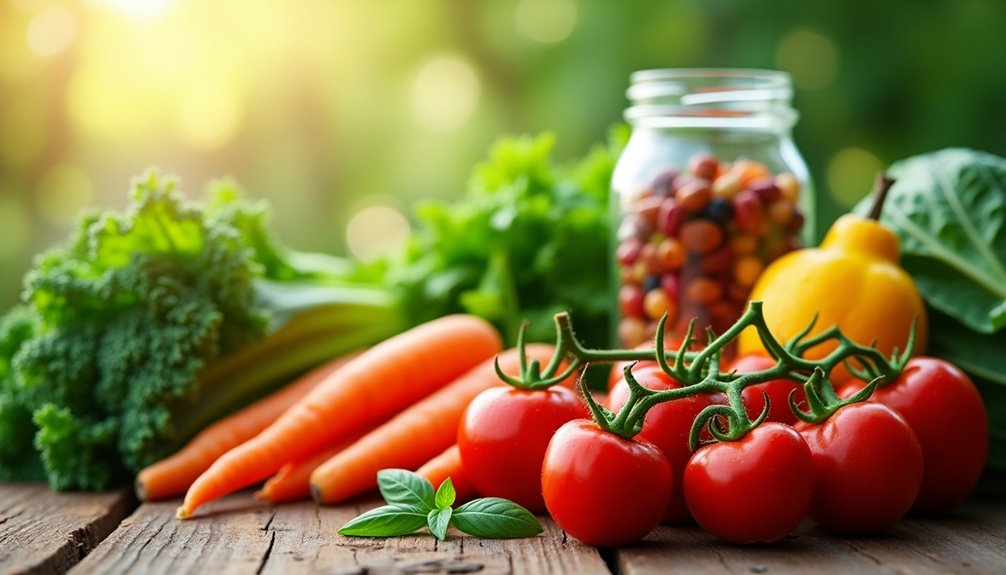
Choosing a vegetarian diet not only opens up a wealth of culinary options but also brings a host of health benefits. One of the most significant advantages is its potential for disease prevention. Research shows that individuals following a vegetarian diet tend to have lower risks of heart disease, high blood pressure, and type 2 diabetes. By focusing on plant-based foods, you're likely to consume more fiber and antioxidants, which contribute to overall health and longevity.
Weight management is another area where a vegetarian lifestyle can shine. Many plant-based foods are lower in calories and high in nutrients, making it easier for you to maintain a healthy weight. When you choose whole grains, fruits, and vegetables over processed foods, you're not only nourishing your body but also boosting your energy levels. A plant-based diet can further enhance your health by providing essential vitamins and minerals.
With increased energy, you'll find it easier to engage in physical activities, further supporting your health goals.
Moreover, a vegetarian diet often encourages mindfulness about what you eat. This awareness can lead to better food choices that enhance your well-being. By joining the vegetarian community, you also connect with others who share similar values, fostering a sense of belonging and support.
Nutritional Considerations
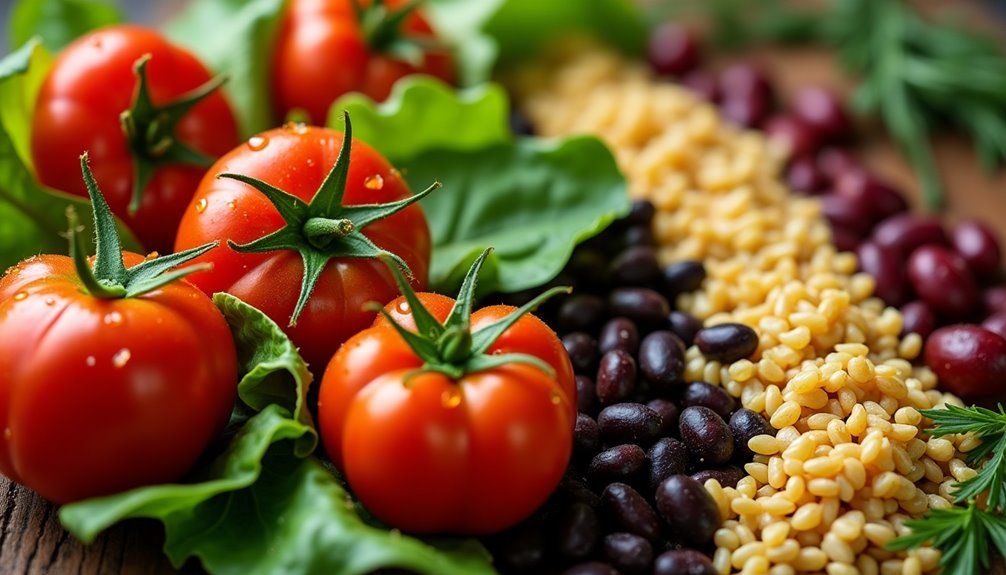
When adopting a vegetarian diet, it's essential to make certain you're getting all the essential nutrients your body needs. While a vegetarian diet can offer numerous benefits, it can also present challenges, particularly when it comes to key nutrients. Here are some nutritional considerations to keep in mind:
- Protein Sources: Unlike meat, plant-based proteins may not contain all necessary amino acids. Incorporate a variety of sources like beans, lentils, quinoa, and tofu to make sure you're meeting your protein needs.
- Vitamin B12: This vitamin is primarily found in animal products, so consider fortified foods or supplements to prevent deficiencies, which can lead to fatigue and neurological issues.
- Iron: Plant-based iron (non-heme iron) isn't as easily absorbed as the iron from meat. Pair iron-rich foods like spinach and lentils with vitamin C-rich foods like bell peppers to boost absorption.
- Omega-3 Fatty Acids: These are important for heart and brain health. Include sources such as flaxseeds, chia seeds, and walnuts in your diet to support your overall well-being.
Additionally, it's beneficial to stay informed about keto diet benefits to explore various dietary approaches that can complement your vegetarian lifestyle.
Types of Vegetarian Diets
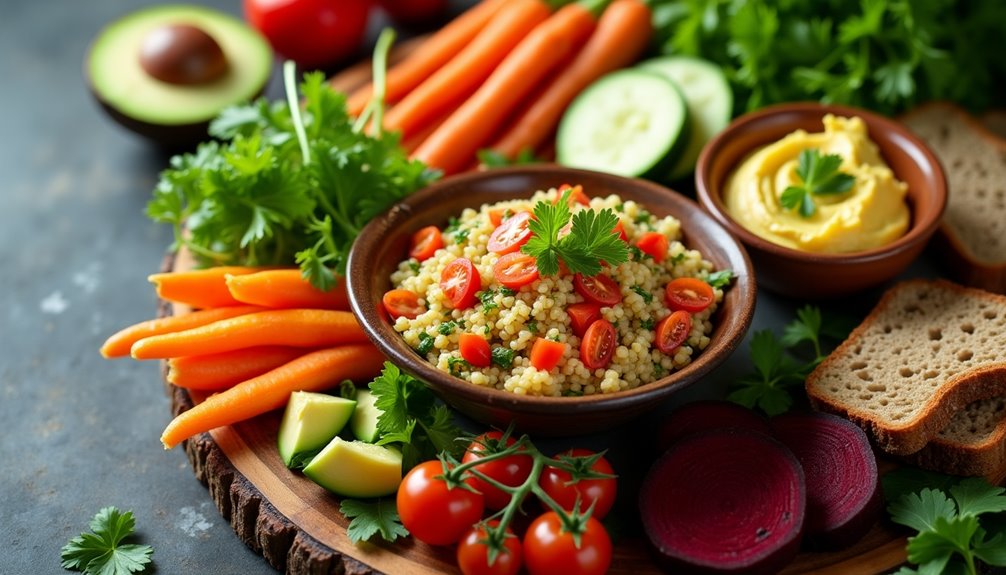
Exploring the various types of vegetarian diets can help you find the approach that best suits your lifestyle and health goals. One popular option is the flexitarian approach, which encourages a primarily plant-based diet while allowing for occasional meat consumption. This flexible method can easily accommodate your dietary restrictions and preferences, making it an accessible choice for many individuals.
Another common type is the lacto-vegetarian diet, which includes dairy products but excludes eggs. If you're someone who enjoys cheese and yogurt, this could be a great fit for you.
On the other hand, the ovo-vegetarian diet permits eggs but excludes dairy, catering to those who may have lactose intolerance or prefer to avoid dairy for other reasons.
Moving further along the spectrum, you'll find the lacto-ovo vegetarian diet, which includes both dairy and eggs. This is one of the most popular vegetarian diets and offers a wide range of plant-based options, ensuring a balanced intake of essential nutrients.
Lastly, there's the strict vegetarian or vegan diet, which eliminates all animal products. This approach often resonates with those influenced by cultural beliefs or ethical considerations surrounding animal welfare. It requires meticulous planning to guarantee nutritional adequacy, but many find immense satisfaction in adopting this lifestyle. Additionally, embracing a vegan diet can significantly reduce greenhouse gas emissions and contribute positively to the environment.
Regardless of the type you choose, understanding these options allows you to embrace a vegetarian diet that aligns with your values and health needs while fostering a sense of belonging in a community that shares similar goals.
Environmental Impact
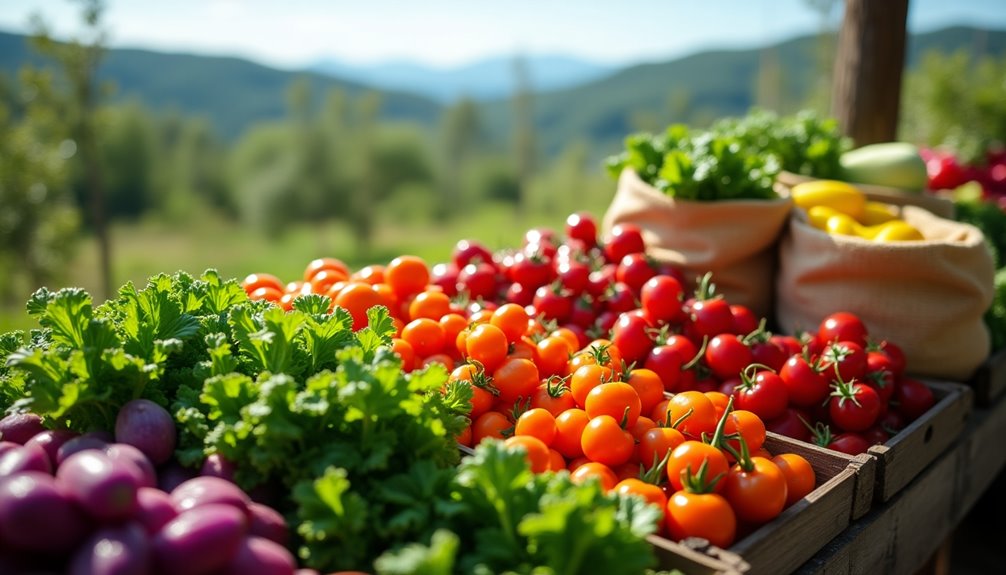
Adopting a vegetarian diet notably reduces your environmental footprint, making it a powerful choice for those concerned about sustainability. The impact of your food choices goes beyond personal health; it markedly affects the planet.
Here are four key ways a vegetarian diet contributes to a healthier environment:
- Lower Carbon Footprint: Livestock farming generates more greenhouse gases than all the world's cars, planes, and trains combined. By reducing or eliminating meat from your diet, you can help cut down on these emissions.
- Sustainable Agriculture Practices: Plant-based diets often rely on less resource-intensive agriculture. Growing vegetables and grains typically requires less land and water than raising animals, making it a more sustainable option.
- Reduced Land Use: Animal farming occupies nearly 80% of the world's agricultural land. By choosing vegetarianism, you're advocating for more efficient land use, which can preserve ecosystems and wildlife habitats.
- Less Water Consumption: Producing meat requires notably more water than growing plant-based foods. For instance, it takes around 1,800 gallons of water to produce just one pound of beef. By going vegetarian, you help conserve precious water resources. Additionally, a vegetarian diet can reduce joint pressure on the environment, similar to how mini bands reduce joint pressure during workouts.
Ethical Reasons for Choosing Vegetarianism

The choice to adopt a vegetarian diet isn't just about personal health or environmental sustainability; it also encompasses significant ethical considerations. When you choose vegetarianism, you're often guided by a commitment to animal welfare. Many people believe that all living beings deserve to live free from suffering, and this belief can shape your dietary choices. By opting for plant-based foods, you actively reject practices that involve factory farming, which is frequently criticized for its inhumane treatment of animals.
Your moral values play a pivotal role in this decision. You might find that aligning your eating habits with your ethics fosters a sense of integrity and belonging within a community that shares similar views. Studies indicate that individuals who prioritize ethical eating often report higher levels of personal satisfaction and connection with others who share these ideals.
Moreover, the discomfort surrounding the consumption of meat often arises from an awareness of how animals are raised and slaughtered. By choosing vegetarianism, you're making a conscious effort to minimize harm to sentient beings. This choice can resonate deeply with your personal beliefs about kindness and respect for all life forms. Additionally, many people are unaware that oxidized cholesterol is a significant factor in heart disease, further emphasizing the importance of heart-healthy dietary choices.
Ultimately, embracing a vegetarian lifestyle can reflect a profound commitment to ethical living. It's about more than just food; it's about creating a compassionate world where your choices resonate with your values, fostering a sense of community among those who share your passion for animal welfare and ethical considerations.
Common Misconceptions
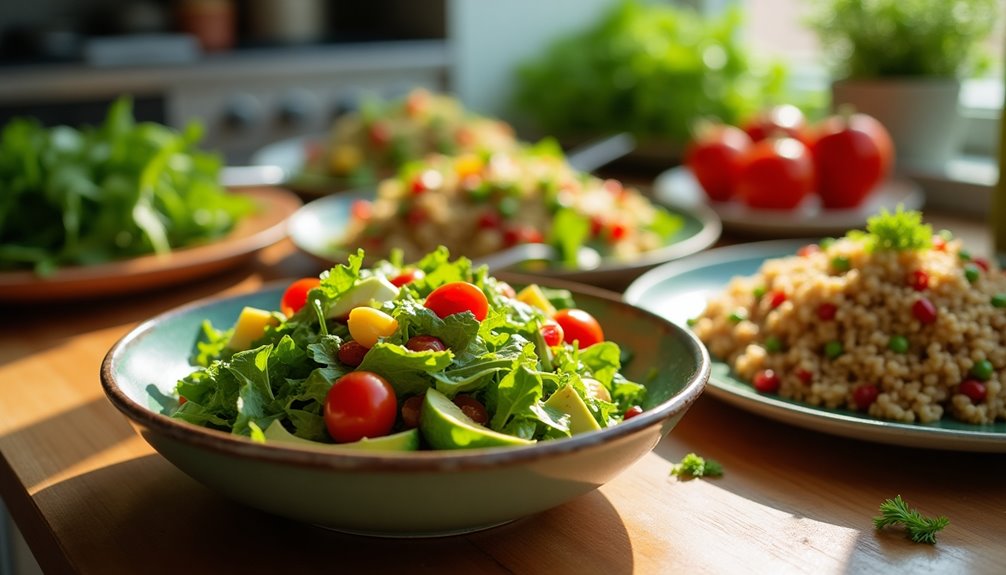
While many people view vegetarianism as a restrictive lifestyle, it's often misunderstood in several key ways. Here are some common misconceptions that you might encounter:
- Lack of Protein: A widespread belief is that vegetarians can't get enough protein. In reality, there are numerous protein sources available, including legumes, lentils, quinoa, tofu, and even certain grains. With a little planning, you can meet your protein needs easily.
- Limited Food Choices: Some think that being vegetarian means eating only salads and vegetables. However, the vegetarian diet is diverse and can include a variety of delicious foods, from hearty grain bowls to flavorful curries. You can explore cuisines from around the world!
- Nutritional Deficiencies: There's a concern that vegetarians miss out on essential nutrients. While it's true that certain nutrients, like Vitamin B12 and iron, require attention, many vegetarians can obtain them from fortified foods or supplements. It's also important to consider the potential risks of consuming high glycemic foods that can affect overall health.
- Cultural Beliefs: Another misconception is that vegetarianism is only for specific cultures or lifestyles. In fact, vegetarian diets are practiced globally, reflecting a wide range of cultural beliefs and traditions.
Understanding these misconceptions can help you navigate conversations about vegetarianism more effectively. By challenging these beliefs, you can foster a more inclusive dialogue about food choices and promote a greater appreciation for the vegetarian lifestyle.
Tips for Transitioning

Shifting to a vegetarian diet can feel overwhelming, but it doesn't have to be. Taking a few simple steps can ease your shift and help you thrive in your new eating habits. Start with meal planning; this is essential for success. By outlining your meals for the week, you can guarantee you're incorporating a variety of foods, preventing boredom and nutritional deficiencies. Focus on including a balance of fruits, vegetables, grains, and legumes to create satisfying meals.
One common concern when going vegetarian is getting enough protein. Don't worry—there are plenty of delicious and nutritious protein sources available. Consider incorporating beans, lentils, tofu, tempeh, and edamame into your meals. Quinoa and nuts are also excellent options, providing both protein and healthy fats. By diversifying your protein sources, you'll not only meet your nutritional needs but also discover new flavors and textures to enjoy.
Try to ease into the shift by starting with one meat-free day a week, gradually increasing to two or more. This approach gives you time to experiment with new recipes and find what you love. If you encounter challenges or cravings, don't be too hard on yourself; it's all part of the journey. Remember that embracing a natural cycle of consumption can promote a lean and healthy body, similar to the way our ancestors ate(https://example.com).
Delicious Vegetarian Recipes
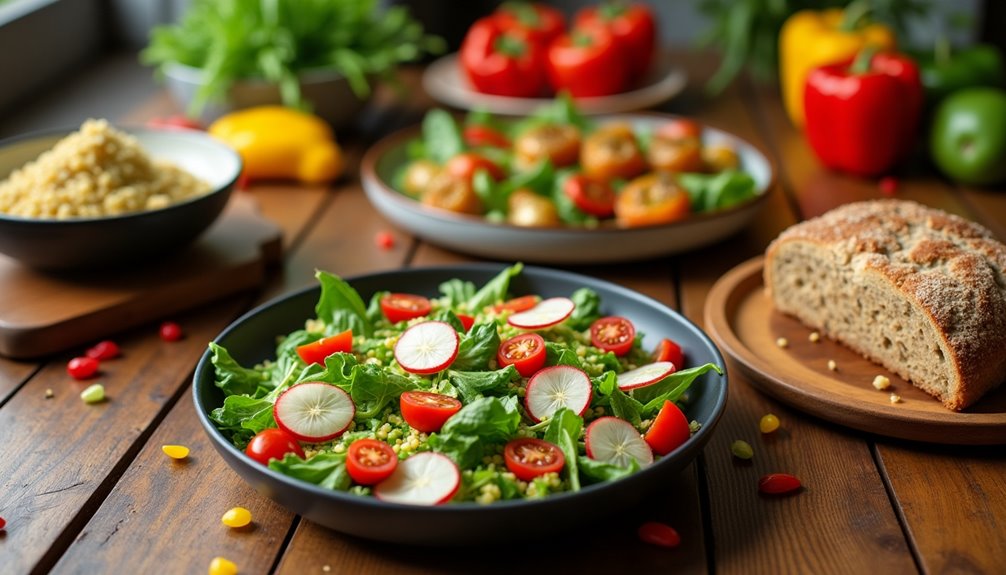
Exploring new vegetarian recipes can be one of the most enjoyable parts of adopting a meat-free lifestyle. With a variety of flavorful plant-based dishes available, you can satisfy your cravings while embracing a healthier diet. Here are four delicious vegetarian recipes to try that showcase meat alternatives beautifully:
- Chickpea Curry: This hearty dish combines chickpeas, coconut milk, and an array of spices. It's packed with protein and fiber, making it a satisfying meal.
- Quinoa Stuffed Peppers: Fill bell peppers with a mix of quinoa, black beans, corn, and spices for a colorful and nutritious dinner. This dish isn't only filling but also visually appealing.
- Mushroom and Spinach Lasagna: Layered with rich marinara sauce, creamy ricotta, and sautéed mushrooms and spinach, this lasagna offers comfort food without the meat. It's a great way to incorporate vegetables into a beloved classic.
- Lentil Tacos: Swap out traditional taco meat for lentils seasoned with taco spices. Top with avocado, salsa, and your favorite veggies for a fun twist on Taco Night.
These recipes illustrate how meat alternatives can create satisfying and flavorful meals. By experimenting with these dishes, you'll discover that a vegetarian diet doesn't mean sacrificing taste or variety. The variety of delicious Keto recipes available will inspire you to embrace a diet full of delightful options while feeling a sense of belonging to a community that values health, sustainability, and delicious food. Enjoy the journey of cooking and sharing these delightful meals!
Resources for Further Learning
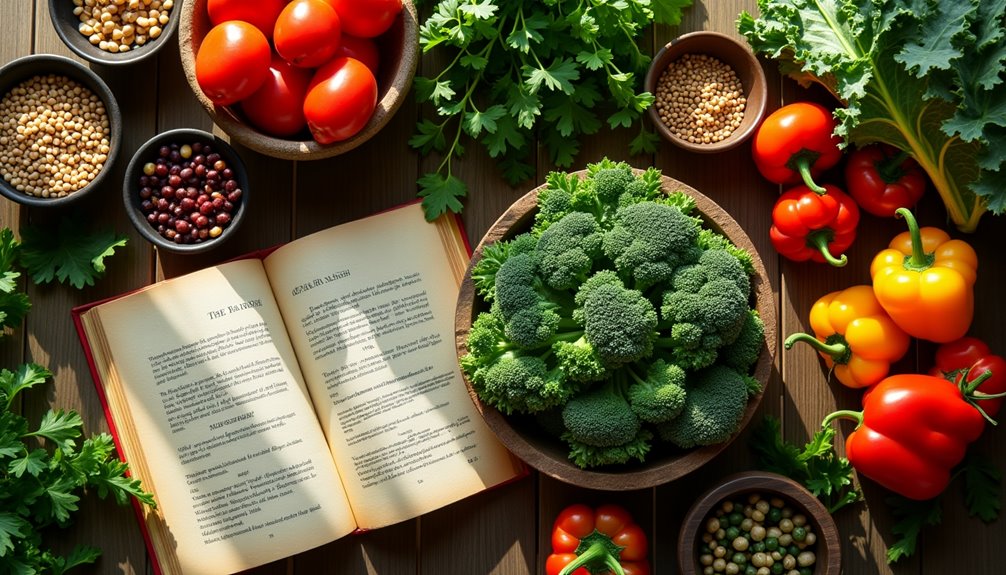
To deepen your grasp of vegetarianism and enhance your culinary abilities, a variety of resources are available that can guide you on this journey. From cookbooks to online platforms, exploring these tools will help you uncover delicious meat alternatives and diverse protein sources that can enrich your meals.
Here's a table of valuable resources to explore:
| Resource Type | Description | Recommended For |
|---|---|---|
| Cookbooks | In-depth recipes and meal plans for vegetarians. | Beginners and experienced cooks |
| Online Courses | Structured learning on vegetarian cooking techniques. | Learners who prefer guided instruction |
| Blogs and Websites | Personal stories and tips from seasoned vegetarians. | Those seeking community and inspiration |
| Documentaries | Insightful films about vegetarianism and its benefits. | Visual learners and curious minds |
| Nutrition Guides | Extensive information on plant-based nutrition. | Anyone wanting to optimize their diet |
These resources can help you navigate the world of vegetarianism, providing you with the knowledge to select suitable meat alternatives and protein sources. As you explore, you'll find not just recipes, but a community of like-minded individuals who share your passion for a vegetarian lifestyle. Engaging with these materials will not only enhance your cooking skills but also deepen your appreciation for the nutritional benefits of a vegetarian diet. Embrace this journey, and you'll discover a fulfilling and sustainable way to nourish yourself. Additionally, consider incorporating natural neuropathy relief into your diet to support overall health and wellness.
Frequently Asked Questions
Can Vegetarians Eat Honey or Dairy Products?
When considering whether to include honey or dairy in your diet, you'll encounter the honey debate and the dairy dilemma. Some people see honey as a natural sweetener, while others argue it involves animal exploitation.
Similarly, dairy products can be contentious; many enjoy them for their nutritional benefits, but others avoid them for ethical reasons. Ultimately, it's about what aligns with your values and beliefs—finding a balance that feels right for you.
Are Vegetarian Diets Suitable for Children and Pregnant Women?
When considering whether a diet's suitable for children and pregnant women, it's important to meet their nutrient needs. A well-planned vegetarian diet can provide essential vitamins and minerals, but there are potential risks if not balanced properly. You should guarantee adequate intake of protein, iron, calcium, and vitamin B12. Consulting a healthcare provider or nutritionist can help you create a nourishing meal plan that supports growth and health during these important life stages.
How Do I Maintain a Vegetarian Diet When Traveling?
Maintaining a vegetarian diet while traveling can be easy with some planning. Start by packing snacks like nuts, dried fruits, or protein bars to keep hunger at bay.
Next, research restaurants at your destination that cater to vegetarian options, using apps or websites to find suitable spots.
Engaging with local vegetarian communities online can provide helpful recommendations, making your travels enjoyable and fulfilling while sticking to your dietary choices.
What Are Some Vegetarian-Friendly Fast Food Options?
When you're on the go and craving fast food, you've got plenty of vegetarian-friendly options. Many places offer plant-based protein choices like black bean burgers or veggie wraps.
Check out meat substitutes like Impossible or Beyond Meat patties, which mimic the taste of meat without sacrificing flavor.
Don't forget to customize your order with extra veggies or sauces to make it satisfying. You can enjoy fast food while sticking to your preferences!
Can a Vegetarian Diet Help With Weight Loss?
You might think that losing weight is just about cutting calories, but achieving nutrient balance is truly crucial. A well-thought-out meal strategy can work wonders for your weight goals. By emphasizing whole foods like fruits, vegetables, and legumes, you're not just shedding pounds; you're nourishing your body.
While planning your meals wisely is vital, you'll likely find that a balanced diet keeps you satisfied and engaged in your health journey.
Conclusion
In embracing a vegetarian diet, you're not just nourishing your body; you're also contributing to a healthier planet. Imagine bustling markets brimming with vibrant fruits and vegetables, each bite bursting with flavor and essentiality. Studies show that plant-based diets can lower the risk of chronic diseases and reduce your carbon footprint. As you shift, remember that every meal is an opportunity to explore new tastes and textures. Your journey toward vegetarianism can lead to a more sustainable and rewarding lifestyle.

